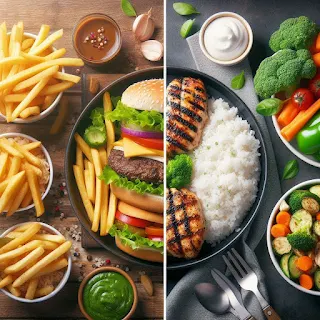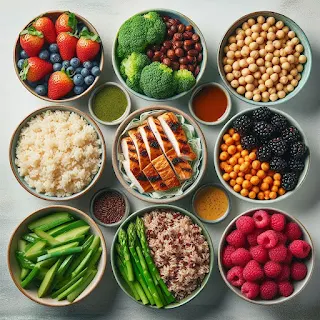Starting your healthy meal prep journey can feel confusing at first. But with the right tips and a simple step-by-step plan, anyone can build better eating habits. Whether you're trying to save money, lose weight, or simply eat cleaner, this complete guide on how to get started with healthy meal prep will make it easy for you.
This blog covers everything from beginner tips to grocery lists, real-life examples, and weekly prep ideas. It’s written in easy English and designed to help you succeed—even if you’ve never cooked before!
Why Healthy Meal Prep is a Life-Changer
Meal prep isn’t just about food—it’s about creating a healthy lifestyle. It helps you stay on track with your diet, manage your time, and avoid the temptation of fast food. When you prepare your meals in advance, you’re more likely to eat balanced dishes that support your health goals.
From saving money to reducing daily stress, meal prep is a powerful tool. Imagine waking up and already knowing what you'll eat for the day. No last-minute decisions. No skipping meals. Just wholesome food ready to nourish your body.
How to Get Started with Healthy Meal Prep as a Beginner
Starting meal prep doesn’t require fancy tools or being a chef. All you need is the willingness to plan. Begin with just 2–3 days a week. Pick simple recipes and shop for fresh ingredients. Start by prepping breakfast or lunch only—then slowly expand as you get comfortable.
Use reusable containers, labels, and a grocery list. Write your meal plan before the week starts. Choose meals you enjoy eating—because if you don’t like the food, you won’t stick to the plan. Focus on balance: add proteins, healthy fats, fiber-rich carbs, and vegetables to each meal.
Best Foods for Healthy Meal Prep
Not all foods are created equal when it comes to meal prepping. Some meals last longer, taste better after storing, and retain nutrients better than others. The best foods for healthy meal prep include grilled chicken, boiled eggs, chickpeas, brown rice, quinoa, broccoli, and mixed vegetables.
Fruits like berries, bananas (for short-term use), apples, and grapes also work well. For snacks, try hummus with veggie sticks, yogurt with nuts, or hard-boiled eggs. Avoid leafy greens unless you keep them dry or add them fresh during the week.
Batch cooking helps here—prepare large quantities and divide them into smaller portions. Use air-tight containers and refrigerate or freeze meals depending on how long you plan to store them.
Easy Meal Prep Recipes to Try This Week
You don’t need a chef’s skill to prepare healthy meals. Start with a few easy recipes like:
- Grilled chicken with brown rice and steamed broccoli
- Chickpea salad with cucumber, tomato, and olive oil dressing
- Boiled eggs with sweet potato mash and green beans
- Oats with chia seeds, banana, and almond butter (overnight)
These are not only easy but also budget-friendly. Cook in bulk on Sunday and portion into containers. Most of these meals can last up to 4 days in the fridge. Add variety by rotating sauces or using different spices.
Don’t forget to prep your snacks too! Keep fruits washed and cut, portion out nuts, and prep healthy dips like guacamole or hummus.
Healthy Grocery List for Meal Prep Success
A successful meal prep week starts at the grocery store. Always shop with a list to avoid junk food temptations. Your healthy grocery list should include:
Proteins
- Chicken breast
- Eggs
- Chickpeas
- Lentils
- Greek yogurt
Carbohydrates
- Brown rice
- Quinoa
- Sweet potatoes
- Whole grain bread
Fruits and Vegetables
- Spinach
- Carrots
- Tomatoes
- Bell peppers
- Berries
Healthy Fats
- Avocados
- Olive oil
- Chia seeds
- Almonds and walnuts
Stick to the outer aisles of the store where fresh produce and protein are found. Avoid the processed food sections unless you're buying healthy canned items like beans or tuna.
How to Save Time and Stay Consistent
Meal prep gets easier with time-saving strategies. Invest in tools like slow cookers, rice cookers, or air fryers. Cook in batches—prepare rice, veggies, and meat at once. Store in airtight containers and freeze extras.
Set one or two days in a week for prep—usually Sunday and Wednesday work best. Play music or podcasts while prepping to make it more fun. Use a planner or app to keep track of what meals you’ve prepped.
Consistency is key. Even if you mess up one week, don’t stop. Go back to your plan the next week. Make it a routine, like brushing your teeth—non-negotiable and rewarding.
Common Meal Prep Mistakes to Avoid
Meal prepping can backfire if you don’t do it right. Avoid these common mistakes:
- Making meals you don’t enjoy
- Over-prepping and wasting food
- Not using proper storage containers
- Skipping seasoning—meals get boring fast
Start small. Prep for 2-3 days only. Store your meals properly using airtight containers. Reheat safely. Avoid prepping salads with dressing already mixed in—they’ll get soggy. Learn and improve each week.
Meal prep is a journey. You’ll get better with time. Focus on progress, not perfection.
FAQs
How long does meal-prepped food last in the fridge?
Most prepped meals last 3–4 days in the fridge. You can freeze some for longer storage—up to 3 months for items like cooked meats and grains.
Can I meal prep if I work full-time?
Yes! Meal prepping saves time. Use weekends to prep for your workweek. Focus on quick recipes and use tools like rice cookers to save energy.
Do I need special containers for meal prep?
While not mandatory, BPA-free, microwave-safe, airtight containers make storage easier and safer. Use glass or high-quality plastic containers.
Is it expensive to meal prep?
No. In fact, meal prepping usually saves money by cutting down on takeout and food waste. Buying ingredients in bulk also helps lower costs.
Can I lose weight with meal prep?
Yes. Controlling ingredients and portions helps support weight loss. Stick to a calorie-conscious, balanced meal plan, and track your progress.
Disclaimer
This blog is for informational purposes only and should not replace professional medical or nutritional advice. Always consult a qualified health provider before making major dietary changes.















No comments:
Post a Comment
I genuinely appreciate you taking the time to read this blog post. Your support, comments, and engagement mean so much to me. Whether you’re here for the first time or have been following along for a while, I’m grateful to have you as part of this journey.
If you found value in this post, please consider sharing it or leaving a comment—your feedback helps me create content that resonates with you. Thank you for being a part of this community!
Warm regards,
Daily Boost Guide